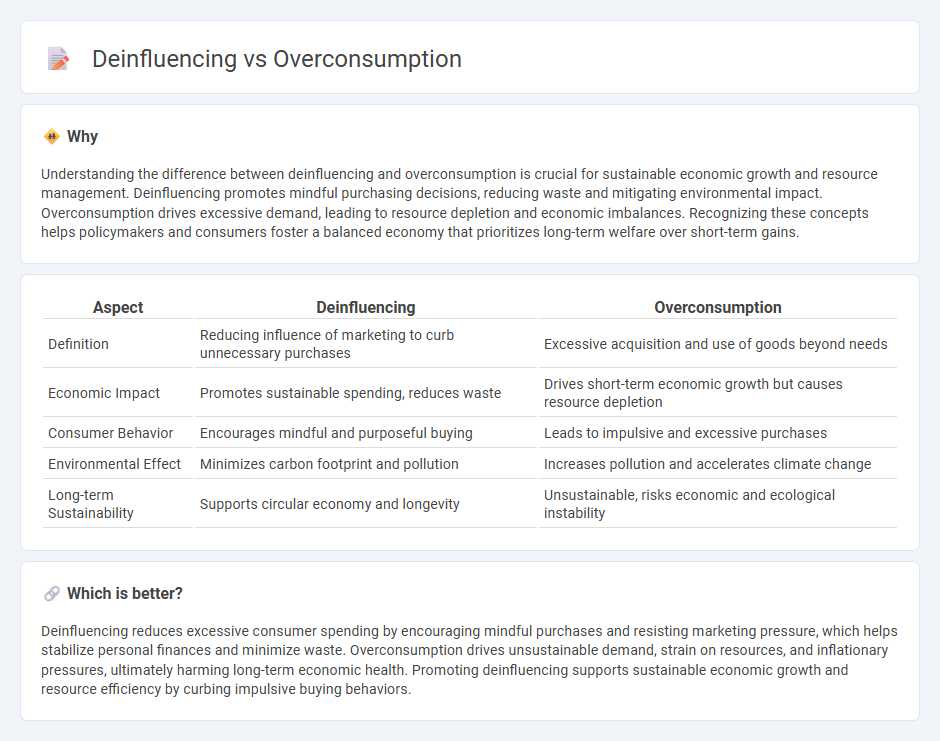
Deinfluencing challenges overconsumption by encouraging mindful purchasing decisions and reducing impulsive buying fueled by social media trends, impacting consumer behavior and market demand. This shift promotes sustainable economic growth by prioritizing quality over quantity, which can decrease waste and environmental strain. Explore how deinfluencing reshapes economic patterns and supports long-term financial wellbeing.
Why it is important
Understanding the difference between deinfluencing and overconsumption is crucial for sustainable economic growth and resource management. Deinfluencing promotes mindful purchasing decisions, reducing waste and mitigating environmental impact. Overconsumption drives excessive demand, leading to resource depletion and economic imbalances. Recognizing these concepts helps policymakers and consumers foster a balanced economy that prioritizes long-term welfare over short-term gains.
Comparison Table
| Aspect | Deinfluencing | Overconsumption |
|---|---|---|
| Definition | Reducing influence of marketing to curb unnecessary purchases | Excessive acquisition and use of goods beyond needs |
| Economic Impact | Promotes sustainable spending, reduces waste | Drives short-term economic growth but causes resource depletion |
| Consumer Behavior | Encourages mindful and purposeful buying | Leads to impulsive and excessive purchases |
| Environmental Effect | Minimizes carbon footprint and pollution | Increases pollution and accelerates climate change |
| Long-term Sustainability | Supports circular economy and longevity | Unsustainable, risks economic and ecological instability |
Which is better?
Deinfluencing reduces excessive consumer spending by encouraging mindful purchases and resisting marketing pressure, which helps stabilize personal finances and minimize waste. Overconsumption drives unsustainable demand, strain on resources, and inflationary pressures, ultimately harming long-term economic health. Promoting deinfluencing supports sustainable economic growth and resource efficiency by curbing impulsive buying behaviors.
Connection
Deinfluencing reduces overconsumption by encouraging consumers to critically evaluate their purchasing decisions, promoting minimalism and mindful spending habits. This shift impacts economic demand patterns, leading to decreased sales in fast fashion and non-essential goods sectors. Businesses must adapt strategies as consumer behavior increasingly favors sustainability and ethical consumption.
Key Terms
Consumerism
Overconsumption drives unsustainable consumerism, leading to excessive resource depletion and environmental harm. Deinfluencing counters this trend by promoting mindful purchasing decisions and reducing impulsive buying behaviors. Discover how deinfluencing reshapes consumer habits for a more sustainable future.
Sustainability
Overconsumption leads to excessive resource depletion, environmental degradation, and increased waste, posing significant challenges to sustainability goals. Deinfluencing promotes mindful consumption by encouraging people to critically evaluate their purchasing choices, reducing unnecessary demand and supporting eco-friendly products. Explore how adopting deinfluencing strategies can drive sustainable behavior and mitigate the environmental impact of overconsumption.
Behavioral Economics
Overconsumption, driven by consumerism and marketing tactics, leads to inefficient resource use and environmental degradation, while deinfluencing encourages mindful purchasing decisions, reducing impulse buying and promoting sustainability. Behavioral economics explores how cognitive biases like social proof and scarcity influence overconsumption and how interventions such as nudging can support deinfluencing practices. Explore how integrating behavioral economics can optimize consumption patterns and foster responsible consumer behavior.
Source and External Links
Overconsumption (economics) - Overconsumption occurs when consumers use goods and services beyond their ability or willingness to replenish them, often resulting in environmental degradation and economic imbalance due to diminishing marginal utility from consumption.
Why overconsumption is a problem and how to stop it - Overconsumption leads to the depletion of Earth's resources at 1.7 times its regeneration rate, causing environmental harm, social injustice, and economic issues like increased debt and stress, with solutions focused on sustainable habits and reducing waste.
How Overconsumption Affects the Environment and Health ... - Technological advances have increased production and consumption capacity, making it easier for higher-income countries to consume disproportionately more resources, contributing significantly to global unsustainability.
 dowidth.com
dowidth.com